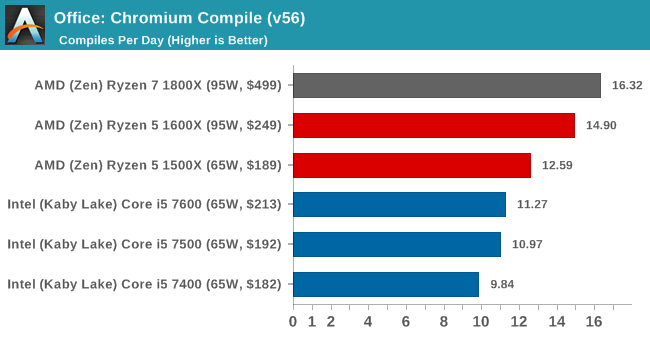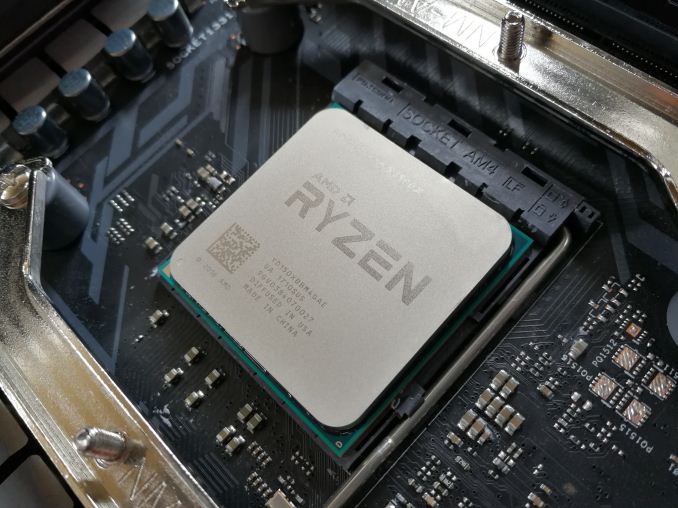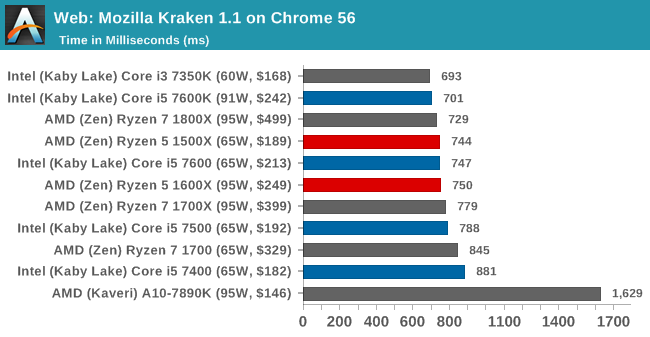The AMD Ryzen 5 1600X vs Core i5 Review: Twelve Threads vs Four at $250
by Ian Cutress on April 11, 2017 9:00 AM ESTAMD Ryzen 5
We mentioned at the top of the review that AMD’s Ryzen 7 launch last month benefited in a market where the competition was extremely expensive – being able to offer equivalent performance in most tasks and then undercut the competition by 50% is a difficult task, but the opening was always there due to a lack of competition in this space. When it comes to the mainstream market, the Ryzen 5 processors are actually competing on price with Intel’s processors directly, and thus has to offer something more to compete.
We have already shown in previous reviews that the Zen microarchitecture from AMD is around the equivalent of Intel’s Broadwell microarchitecture, but at this lower price point we have AMD’s Zen against Intel’s Kaby Lake, which is two generations newer than Broadwell and affords a comfortable IPC uplift over Broadwell. Given AMD’s monolithic design strategy of a single silicon die catering for most of their product line (well, all of it so far), the way AMD is tackling this is through more cores.
Before the debate about cores from AMD’s past rears its head (Vishera/Bulldozer designs in that case), given that AMD’s single thread performance is not too far behind, having a big set of cores as an alternative is something interesting for end-users, especially as more work flows and gaming titles rely on multithreading to scale. As a result, where Intel offer four cores and four threads, AMD is now offering six cores and twelve threads – a potential +200% uptick in the number of threads and +50% in cores, albeit at 10-15% lower instructions per clock.
(There’s also a side argument here about die sizes and wafer costs to each company to consider, but we will leave that for a different piece.)
For this review, based on time and available parts, we tested the Ryzen 5 1600X six-core processor against a set of Intel Core i5 parts that users might also be considering. We have some Ryzen 5 1500X quad-core numbers in here as well, and that might be spun out into a separate review at a later date. We also demonstrated our new 2017 CPU gaming tests, with four GPUs, six tests, two resolutions per test, and a couple of extra extreme resolution tests.
On The Benchmark Results
Looking at the results, it’s hard to notice the effect that 12 threads has on multithreaded CPU tests. The usual culprits show big wins for AMD here: 2D to 3D photo conversion, ray tracing, Blender, Cinebench, Encryption and video transcoding are all sizable wins. This is the sort of workload in which moving up to the Ryzen 7 CPUs, budget permitting, also do well on.
A new test in our suite for this review is a Compile Chromium test on Windows. As part of our testing suite, we have a fixed nightly download from mid-March and set this to compile, taking the final time and converting it into how many compiles per day. For around $250, Ryzen is the only way to go:

As you would expect, AMD still lags in IPC to Intel, so a 4.0 GHz AMD chip can somewhat compete in single threaded tests when the Intel CPU is around 3.5-3.6 GHz, and the single thread web tests/Cinebench results show that.
On The Gaming
Our gaming tests are a mix of Full-HD and 4K testing, some of which ends up being more CPU limited than we expected.
Civilization, at both 1080p and 4K Ultra settings, seem to scale quite happily with more cores on all GPUs, except the GTX 1060 at 4K. It’s worth noting situations such as the R9 Fury at 1080p Ultra only has 920ms under 60 FPS on the 1600X, compared to 6300 milliseconds on the Core i5-7600.
Shadow of Mordor leans towards the higher IPC of Intel, as the DX11 title cannot take advantage of the cores as much. Rise of the Tomb Raider’s benchmark is notorious for having each of its three seconds perform differently with respect to CPU scaling, with the Prophets scene being more CPU limited than the rest of the stage in the game.
Rocket League using an AMD CPU + AMD GPU actually provides more equal results with NVIDIA GPUs, however there's a performance drop using Ryzen + NVIDIA, which potentially correlates towards a driver bug but we're not 100% sure what is going on. Grand Theft Auto is a mixed bag, despite being a DX11 title – in some situations the Ryzen 5 is ahead of the Intel CPUs, or they all perform about the same, or the Intel CPUs pull ahead.
I have $250, What Should I Get – the Core i5 7600/7600K or the Ryzen 5 1600X?
Platform wise, the Intel side can offer more features on Z270 over AM4, however AMD would point to the lower platform cost of B350 that could be invested elsewhere in a system.
On performance, for anyone wanting to do intense CPU work, the Ryzen gets a nod here. Twelve threads are hard to miss at this price point. For more punchy work, you need a high frequency i5 to take advantage of the IPC differences that Intel has.
For gaming, our DX12 titles show a plus for AMD in any CPU limited scenario, such as Civilization or Rise of the Tomb Raider in certain scenes. For e-Sports, and most games based on DX9 or DX11, the Intel CPU is still a win here.












254 Comments
View All Comments
Arbie - Wednesday, April 12, 2017 - link
I agree - this is implying the reverse of what was probably meant. And it's still broken.coder543 - Tuesday, April 11, 2017 - link
"For $250, the top Ryzen 5 1600X gives six cores and twelve threads of AMD’s latest microarchitecture, while $250 will only get you four cores and no extra threads for the same price."You're missing a word in here. That word is "Intel". Right now, the opening paragraph contains one of the most confusing sentences ever written, because the only brand mentioned is AMD, where $250 simultaneously gets you 6 cores and 12 threads *and* only 4 cores? Please update this paragraph to show that Intel only gets you 4 cores.
Arbie - Tuesday, April 11, 2017 - link
I agree - you really need to add "with Intel". This is a theme statement for the entire article and worth fixing.CaedenV - Tuesday, April 11, 2017 - link
Well, that review was surprising.I am looking to re-do my system in the next year or so, and I thought for sure that the R5 would be the no-brainer pick. But that seems not to be the case. If on a tight budget it looks like the i3 is the all-around value king offering great single-thread performance and decent light to moderate gaming. The i5 still reigns king for non-production work while being right about the same price point as the R5. And if doing production work the R7 really makes more sense as it is not that much more expensive while offering much better render performance. I somehow thought that the R5 would be better priced against the i5, just as the R7 stomps all over the i7 chips.
So now when I look at building my next PC the real question is how much production work I plan on doing. If it is a lot then the R7 is the way to go. But if I am just doing media consumption and gaming then perhaps the Intel i5 will still be the best option. Hmm... maybe I'll just wait a bit longer. I mean, my i7 2600 still keeps chugging along and keeping up. The real temptation to upgrade is DDR4, USB-C, m.2, and PCIe v3. Seeing more 10gig Ethernet would also be a big temptation for an upgrade, but I think we are still 2-3 years out on that. Any up-tick in raw CPU performance is really a secondary consideration these days.
snarfbot - Tuesday, April 11, 2017 - link
That is a strange position indeed, as it conflicts with all the data in the review.In other words lol wut?
Meteor2 - Wednesday, April 12, 2017 - link
Indeed. My conclusion was 'wow, AMD have knocked it out of the park'. Same or better gaming, far better production.Cooe - Monday, March 1, 2021 - link
What happened to your "Ryzen 5 will be shit" comments from all over the OG Ryzen 7 review???Drumsticks - Tuesday, April 11, 2017 - link
It's not really hard to figure out. If you just do media and gaming, stick with Intel.If you rely on your home PC for any significant measure of production work, you should probably be buying the most expensive Ryzen chip you can.
gerz1219 - Tuesday, April 11, 2017 - link
Yeah, for the longest time I've maintained separate rigs for gaming and video work, but I'm in the process of building a hybrid machine and the Ryzen 7 chips came out at just the right time. I just ordered an 1800X for my new workstation/gaming/VR rig. Gaming performance is somewhat important to me, but I can handle lower frame rates in certain games versus the 7700K because for my post-production video work, I need those extra cores and threads. For the longest time Intel was able to charge whatever they wanted at the high-end and prices had gotten ridiculous, so the 7-series fills a huge niche.However, it seems less clear where the Ryzen 3 and 5 chips will fit in. People who only use their machines for games won't see very many of the benefits of the Zen architecture, but they're saddled with the weaknesses of relatively slower single-threaded performance, and AMD isn't competing on price.
msroadkill612 - Thursday, April 13, 2017 - link
You did luck out. u r the perfect ryzen demographic.I suspect teamed with a vega 8GB hbm & a pcie ssd, it will blow you away by xmas.
But the 1600 6 core comes close mostly, for $250~ less.